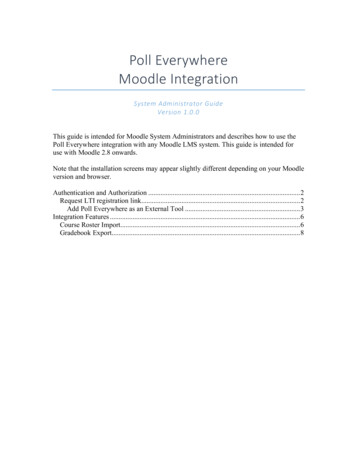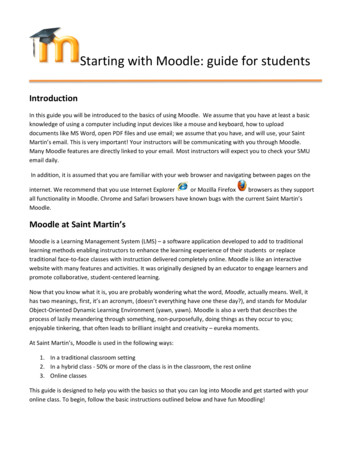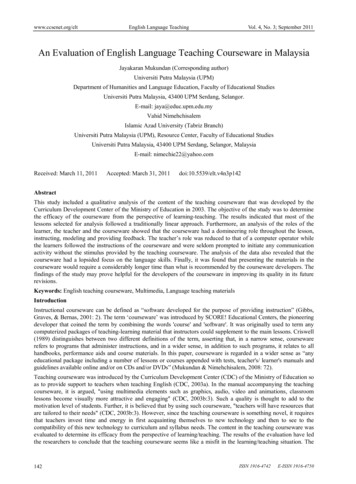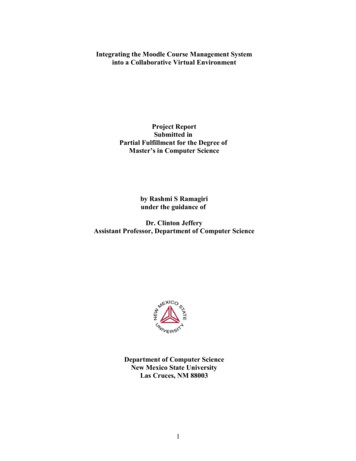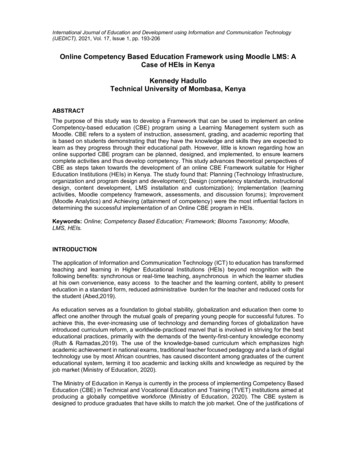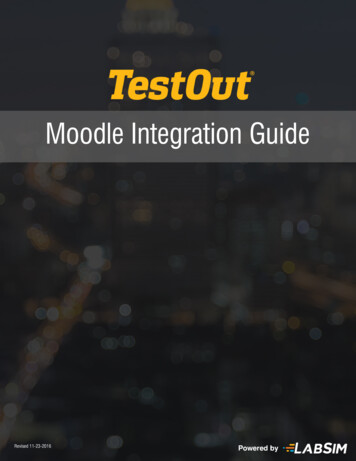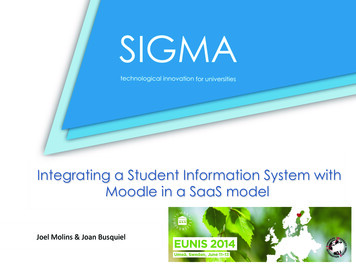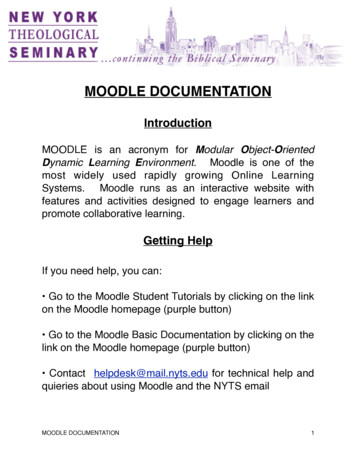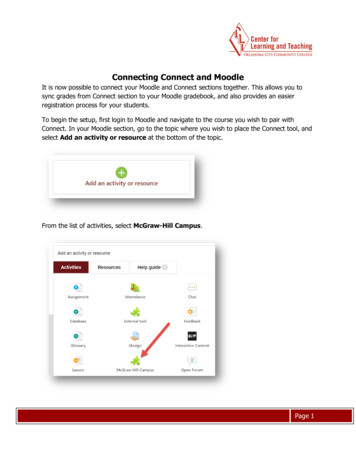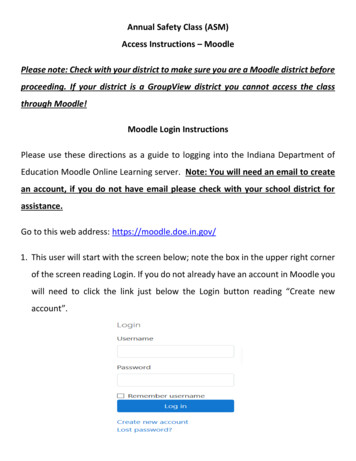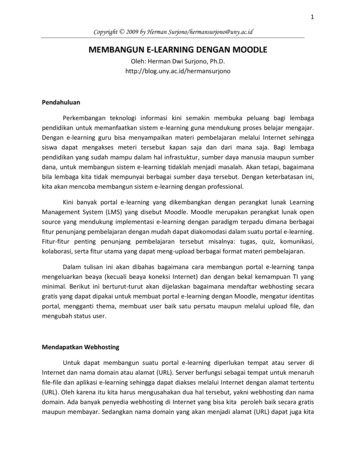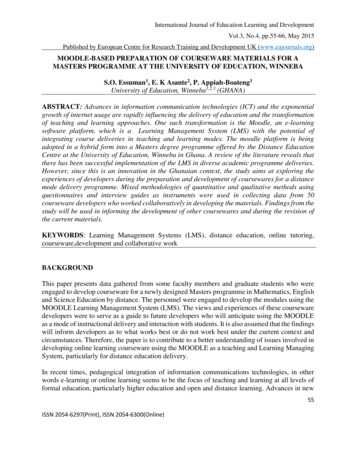
Transcription
International Journal of Education Learning and DevelopmentVol.3, No.4, pp.55-66, May 2015Published by European Centre for Research Training and Development UK (www.eajournals.org)MOODLE-BASED PREPARATION OF COURSEWARE MATERIALS FOR AMASTERS PROGRAMME AT THE UNIVERSITY OF EDUCATION, WINNEBAS.O. Essuman1, E. K Asante2, P. Appiah-Boateng3University of Education, Winneba1,2,3 (GHANA)ABSTRACT: Advances in information communication technologies (ICT) and the exponentialgrowth of internet usage are rapidly influencing the delivery of education and the transformationof teaching and learning approaches. One such transformation is the Moodle, an e-learningsoftware platform, which is a Learning Management System (LMS) with the potential ofintegrating course deliveries in teaching and learning modes. The moodle platform is beingadopted in a hybrid form into a Masters degree programme offered by the Distance EducationCentre at the University of Education, Winneba in Ghana. A review of the literature reveals thatthere has been successful implementation of the LMS in diverse academic programme deliveries.However, since this is an innovation in the Ghanaian context, the study aims at exploring theexperiences of developers during the preparation and development of coursewares for a distancemode delivery programme. Mixed methodologies of quantitative and qualitative methods usingquestionnaires and interview guides as instruments were used in collecting data from 50courseware developers who worked collaboratively in developing the materials. Findings from thestudy will be used in informing the development of other coursewares and during the revision ofthe current materials.KEYWORDS: Learning Management Systems (LMS), distance education, online tutoring,courseware,development and collaborative workBACKGROUNDThis paper presents data gathered from some faculty members and graduate students who wereengaged to develop courseware for a newly designed Masters programme in Mathematics, Englishand Science Education by distance. The personnel were engaged to develop the modules using theMOODLE Learning Management System (LMS). The views and experiences of these coursewaredevelopers were to serve as a guide to future developers who will anticipate using the MOODLEas a mode of instructional delivery and interaction with students. It is also assumed that the findingswill inform developers as to what works best or do not work best under the current context andcircumstances. Therefore, the paper is to contribute to a better understanding of issues involved indeveloping online learning courseware using the MOODLE as a teaching and Learning ManagingSystem, particularly for distance education delivery.In recent times, pedagogical integration of information communications technologies, in otherwords e-learning or online learning seems to be the focus of teaching and learning at all levels offormal education, particularly higher education and open and distance learning. Advances in new55ISSN 2054-6297(Print), ISSN 2054-6300(Online)
International Journal of Education Learning and DevelopmentVol.3, No.4, pp.55-66, May 2015Published by European Centre for Research Training and Development UK (www.eajournals.org)technologies and the exponential growth of internet usage collaboratively are rapidly influencingthe delivery of higher education programmes thereby transforming how teaching and learningshould be done in the present learning environment. One such transformation is the MOODLE, ane-learning software platform, which is a Learning Management System (LMS). MOODLE is anabbreviation, which stands for Modular Object-Oriented Dynamic Learning Environment. It is aLearning Management System for producing internet-based courses and helps instructors delivertheir instructions virtually. The LMS is assumed to have the potential of integrating the deliveryof courses into a teaching and learning mode. Swinney (2004), cited in Vovides, Sanchez-Alonso,Mitropoulou & Nickmans, 2007) indicates that the implementation of LMS in higher educationinstitutions depends on the insurgency of educational technology that promised better quality,learner-centered education with an emphasis on training independent and active students. Boud et.al. (2001), writing about the extent to which higher education has embraced the use of LMS, assertsthat it is broadly accepted that the almost universal response to e-learning within Universities hasbeen the selection and use of LMS.But interestingly, Weaver, Spratt and Nair (2008), note that many higher education institutionshave implemented a learning management system (LMS) to manage online learning and teaching,with varying levels of support provided to staff and students, but often there is little subsequentinvestigation into the quality of the online sites or the use made of the support structures provided.These issues call for investigation just as this study seeks to do.A brief review of the literature reveals the successful implementation of LMS use in diverseprogrammes and contexts. However, there is still insufficient insight into challenges faced duringthe preparation or development process of coursewares by distance mode delivery especially inthe Ghanaian context. This study, therefore aims to find out the lessons learned and challengesencountered during the process of developing courseware modules for distance learners using themoodle platform and from the findings make suggestions for future development.There are several reasons for an institution to adopt and implement online learning in its educationsystem. The literature indicates that some advocates consider the mode as an alternative learningstrategy to reach students who were denied access to the regular face-to-face system. Others are ofthe view that the growth of information technology and the abundance of rich informationresources propel institutions to adopt the strategy so that anytime, anywhere both teachers andlearners could have access to information. There is also the blended or hybrid approach wherelecturers adopt online teaching and learning to augment the traditional classroom delivery as itoffers more resources to students (Spender, 2001)But despite the benefits of online teaching and learning, there are challenges and barriers todeveloping quality and effective learning environments and courseware for learners. The literatureasserts that to develop a high quality courseware, specialized roles of experts are needed to supportthe process to integrate the system into a single systematic life-cycle mode. The roles include:subject-matter experts (content), instructional courseware, designers, courseware authors and56ISSN 2054-6297(Print), ISSN 2054-6300(Online)
International Journal of Education Learning and DevelopmentVol.3, No.4, pp.55-66, May 2015Published by European Centre for Research Training and Development UK (www.eajournals.org)editors, graphic designers (artist), multimedia developers and programmers as the technical andgraphical authorities (Spender, 2001). Researchers (Kamaruddin, 2010, Rezaei, 2009, Helen,2006, and Kabata & Weibe, 2005) have described challenges of developing online coursewarefrom their experiences and studies to include: time, money, workload, balance between technicaldemands and pedagogical goals, skills and ability to cope with technological advancement, highcost of internet access and many more. Song et. al. (2004) state that lack of 'community', difficultyunderstanding instructional goals and technical problems were challenges he uncovered in hisonline experiences. Abdon et.at. (2007) in Rezaei (2009) cite relative and absolute higher cost ofInternet access as a discourage factor to the development of online learning in developingcountries. Others (Ng, 2007; Logan et al. 2002; Betts, 1998) have cited access to the necessaryequipment and technological issues as barriers to developing online learning courseware.Preece, Rogers and Sharp (2002) in Kamaruddin, (2012) are of the viewpoint that the objective ofany courseware developer should be to design and implement a quality product to match the skillsand experience and expectations of its anticipated end users. But often, courseware developershave a different view of the end product and enforces their own desires rather than those of theend users. In terms of media interface design, for example, developers need to consider the graphicvisual and navigation that will engage learners in meaningful authentic tasks (Wilson, JonassenCole, 1993 in Kamaruddin, 2012). In other words, interface courseware design means knowinghow to provide a learning environment that encourages and motivates learners to recognise theimportant concepts of meaningful learning. Thus, simply knowing basic interface design conceptswill not be helpful to courseware developers to create effective learning courseware and facilitatelearning in an electronic environment,At the Centre for Distance Education, University of Education, Winneba, the LMS was adopted ina hybrid form with the print mode to provide a Masters degree programme by distance for teachersin English, Mathematics and Science Education. Three teams of writers in the subject areas wereengaged to develop the modules for the programme. Since the writing and printing of the modulestook a long time, adopting the moodle for the online support was nearly put off, despite theinfluence of the present ICT revolution. One reason given was that the hard print modules wereenough as that had been the practice to meet the needs of all including those in rural communities.However, with the persuasion of the University authorities, the moodle was proposed to be usedto support all masters courses by distance. Thus, writers had the responsibility to undergo trainingand thereafter develop the online components of their courses. This phase was still delayed untilgraduate students in the various subject areas were paired with lecturers to speed up thedevelopment of the coursewares. Implementers of the programme, therefore, sought to find outissues of concern to developers and put measures in place to address similar activities in future.Bonk & Graham (2005) are of the view that blended instruction combines face-to-face instructionwith online instruction in such a unique way that part of the course meetings or learning activitiesare conducted online. Blended or hybrid learning has a number of advantages over the traditionalface-to-face learning which tends to be teacher-centered. This is so due to the combination of57ISSN 2054-6297(Print), ISSN 2054-6300(Online)
International Journal of Education Learning and DevelopmentVol.3, No.4, pp.55-66, May 2015Published by European Centre for Research Training and Development UK (www.eajournals.org)online learning and face-to-face learning in blended instruction. Dukes, Warring and Kirkland(2006) also assert that blended instruction encourages different learning styles and maintainsquality lecturer–student interaction in the classroom at the same time. In other words, wheninstructors replace in-class time with online components such as uploading reading materials forstudents to download prior to class, discussion forums, quiz, etc., it frees up time for the lecturerto address students learning problems or areas that students may find particularly confusing. Thebenefits of using course management systems such as MOODLE as learning tools in the worldtoday cannot be over emphasized especially in developing countries where the cost of proprietaryLMSs are beyond the reach of the Institutions within those countries. It is useful for students toview MOODLE as a virtual classroom where learning materials and activities can be madeavailable by a lecturer for the student to interact with. The benefit of this virtual classroom orplatform for students is that they can have access to it from anywhere in the world at any timeprovided they have access to an Internet connection and a web browser.Statement of the ProblemIt has become necessary that the University of Education, Winneba, a teacher education institutionshould attempt to follow worldwide trend of employing modern approaches to teaching andlearning such as the e-learning LMS especially for its ODL programmes. Therefore, as Centre forDistance Education contemplates the adoption of moodle in its Masters programme and continuesto develop coursewares for other programmes by open and distance learning, it is appropriate toexplore issues relating to the needs of developers that are likely to affect implementation. The mainissue is that developers might have been confronted with certain challenges in relation to theirneeds and attitudes towards the development process in general that decision-makers need to beaware of to inform future activities.The main research question guiding the study is: what views and experiences do UEW coursewaredevelopers hold towards the use of the MOODLE in developing their online coursewares fortutoring distance learners and what are the implications of these for future coursewaredevelopment?Sub-questions guiding the study are:1.What factors are likely to affect courseware developers either positively or negatively inthe process of courseware development?2.What factors do developers consider as challenging in the process of developing theircourseware?3.How did courseware developers collaborate with assistants and facilitators during thedevelopment of their online courseware?The purpose of this study therefore is to get a better understanding of lessons learnt and challengesencountered during the development of the M.Ed. online courseware using moodle so as to informfuture courseware development activities.58ISSN 2054-6297(Print), ISSN 2054-6300(Online)
International Journal of Education Learning and DevelopmentVol.3, No.4, pp.55-66, May 2015Published by European Centre for Research Training and Development UK (www.eajournals.org)METHODOLOGYSince this study was conceived as a result of the long delay that characterized the commencementof the online courseware development, the project team sought to explore the challenges thatsaddled developers and lessons learned from the process. An exploratory research design usingphenomenology method was considered appropriate and was adopted for the study.Phenomenology is a theoretical point of view that advocates a study of direct experiences taken atface value; and one which sees behaviour as determined by the phenomena of experience ratherthan by external, objective and physically described reality (English and English in Cohen et. al.2000). This method rests on an assumption that there is a structure and essence to share anexperience that can be narrated (Pratt, 1992). It seeks to describe the meaning of a concept orphenomenon that several individuals share (Marshall & Rossman, 1999) such as the developmentof courseware, which recently is a common practice in higher education delivery. Forty-sixlecturers and graduate students in the three subject areas were engaged as respondents to aquestionnaire on the training. Ten of them, seven lecturers and three graduate students, werepurposively sampled and interviewed during the final training and modification of the materialsdeveloped. This paper seeks to focus on the analysis and issues emerging from the interviews.Interview is one data collection method that fosters face-to-face interactions with a respondent. Itfacilitates an immediate follow-up for clarification and the discovery of any nuances in culture. Itprovides contextual information, facilitates cooperation and is useful for uncovering respondents’perspectives. (Marshall and Rossman, 2006). The study employed a semi-structured interviewmethod using a guide to collect the data. Since respondents were developers, there was no needfor negotiating access. However, respondents were assured of confidentiality and anonymity, andtheir voluntary consent was sought before the interviews. A systematic format for analyzing datawas designed having the research purpose and the objectives in mind. The questionnaires wereanalyzed using the software package for social science research namely, (SPSS) whilst responsesfrom interviews were transcribed verbatim and thoroughly read through several times so that thedata will be very familiar to researchers. All transcripts were numbered. During the readingprocess, memos were written at the margins of the transcripts to identify ideas and patternsemerging. Findings from the analysis were set for discussion as in the paragraphs following.FINDINGS AND DISCUSSIONThe findings that emerged from the interviews are being addressed in this paper. Responses weregrouped into themes including: positive factors affecting courseware development; factors thatpose as challenges & barriers to courseware developers during the process; opportunities forcollaboration and suggestions for improvements.59ISSN 2054-6297(Print), ISSN 2054-6300(Online)
International Journal of Education Learning and DevelopmentVol.3, No.4, pp.55-66, May 2015Published by European Centre for Research Training and Development UK (www.eajournals.org)Positive Factors Affecting Courseware DevelopmentFrom the total population of 50 developers, 34 responded to the questionnaire so the return ratewas 68%. Out of this, there were 6 females and 28 males. Sixteen (16) of these respondents werein the age bracket of 31-35, with 13 in age range 36-45, 2 between 25-30 years and 3 between 4650 and above. It was not surprising then that most of them, 25 out of 34 indicated that they hadtheir own computers and were bringing them from home. Others were using departmental onesand sometimes had to share with others in the office. To a question of how respondents would ratethe quality of the training contents, most of them, 29 out of 32 rated the sessions good and excellentwith 3 rating them as fair as in Table 1.Table 1: How do you rate the quality of the training materials?Rank13b. How do you rate the Fairquality of the training 1718218114332This was supported during the interviews where almost everyone admitted that the sessions wereeducative, timely for their literature reviews, practical and a lot of hands-on work. This was whatsome respondents said:Well it has been very helpful going thru the lectures that were given by professor I think that wehad a very good exposure to the DE program for me and then the other experience we had wason the hands on at WESCO it was very useful. [Lecturer, Adjah]This one was more or less practical base, you were not just being taught but you were also partakein that you were following the instructor each step of the way so that at the end of the day I realisethat I had both the theoretical skills as well as the hands on practical skills. [Student-Cosmos]Again, another factor that positively influenced the development process was the collaborativemanner in which some lecturers and students worked on their courseware. All three students thatwere interviewed appreciated the team work, support and guidance that they received from theirlecturers and colleague students as well as the instructional designers even though there were othercomments which affected some teams negatively. This was what a student and a lecturer had tosay:60ISSN 2054-6297(Print), ISSN 2054-6300(Online)
International Journal of Education Learning and DevelopmentVol.3, No.4, pp.55-66, May 2015Published by European Centre for Research Training and Development UK (www.eajournals.org)What helped me was that I worked with 'Akosua' so anytime I had a problem I asked for her helpand in time of difficulty we put our heads together and find a solution, where we could not wecalled 'Ray' [the instructional designer] to help us out. [Student-Ben]Yes, the assistants were very useful I was even surprised at how they worked so fast and able tocatch the tits and bits that most lecturers were finding it as a problem. [Lecturer Opon]My TA [Teaching assistant] was good, Akosua she helped me a lot. She even mind to get otherinformation and brought and then we shared before adding it to the the work. She really helpedme a lot. And I think that system even helped this work to go fast. [Lecturer- Alany]What can be gathered from Ben and Opon is that collaboration is critically needed duringcourseware development. Alany, who was a mentor stressed how the student/assistant helped himwith the work. This supports Spender's (2001) assertion that to develop quality courseware,specialized roles and experts are needed at all stages. The students who were graduate studentswere already reading and writing their thesis. The exercise therefore gave them the opportunity toexpand their scope to help their lecturers who served as 'mentors' to them. The teams workedtogether, shared ideas as colleagues on the job. There was collegiality in developing the materialsonline.In a similar vein, the vast knowledge on the internet whereby a click of the button could lead adeveloper to so much information was an influence on developers, especially the students. Someindicated that:There was so much information on the internet, on every aspect of knowledge; whichever wordyou type in you get different forms of it images, video recording as well as content. Then you alsorealise that it is so very convenient. You do it at your own time. Also, with regards to theconvenience were ever you are you just have it. [Student- Justie].To me as a lecturer it has increased my capacity to do a lot . use the computer as a search engineto look for additional information not for the courseware alone but for lecturing students on theregular programme. Gathering material to lecture students in my field of err of the variouscourses . [Lecturer, Ame]Still, other factors that developers considered as having affected the process positively was thenew knowledge and skills being gained on the programme. This was seen as an asset for the future.The continuous readings and expansion of their literature reviews became a regular activity as theygot introduced to new articles, videos and many more materials in their field of study. In addition,the concept of self-directed or self-discovery learning became real to them during this exercise.Two students comments were that:61ISSN 2054-6297(Print), ISSN 2054-6300(Online)
International Journal of Education Learning and DevelopmentVol.3, No.4, pp.55-66, May 2015Published by European Centre for Research Training and Development UK (www.eajournals.org)It makes you marketable; some of the courses we are even developing for the students we have notlearnt it ourselves but because of this programme you need to read it and in doing so it was addingto what I know already. Some of the courses too we were never thought on the graduate programmebut because of this programme I watched the videos on topics and reading the books, I've learnt alot. [Student- Akos]. we were given the opportunity . you do whatever you can do and if you are stuck somewhereyou call somebody and someone is at your aid if you don’t know where to move at every pointthere was somebody is there to help you. [Student- Ben]Challenges Encountered by Courseware Developers in the Process of DesignIn spite of the usefulness that developers found the exercise to be, there were challenges that theyencountered which need to be considered in future exercises. Respondents narrated challengesthat included; time constraints, workload involved, lack of financial motivation, limited resources,slow internet connectivity and a few other misunderstanding among some team members. Thecommonest among these were the lack of resources and the internet connectivity, which almost allof them mentioned. This was what two of them said:It was the accessibility to the internet, you know on campus it was difficult to get itsometimes especially at the South Campus; most of the time it was either slow or or not evenavailable .[Lecturer, Joeanin]Then also the issue of internet services . at the beginning it was not easy. You know we got to thecomputer lab at IEDE we were told that even though they told them verbally, officialcommunication had not taken place so we had to wait. And sometimes you see us sitting outsideon the verandah there trying to get internet services. Anyway, with time those issues were sortedout. [Student, Cos]This is a prerequisite for an effective courseware development implementation. Internetconnectivity or infrastructure development in developing countries is gradually improving eventhough it still persists as a challenge. Nonetheless, developers found a way of getting around itas admitted by the student. Some also indicated acquiring mobile modems to help them work atall times.One of the biggest challenges faced by developers was time constraint in doing the work. This wasindicated by both lecturers and students. considering the fact that lecturers were already loadedwith their regular work, which embodies large class sizes, this was seen as an extra work load thatneeded time to accomplish. It was not surprising therefore that they were unhappy about the lackof financial motivation from the administrators. These were comments from two of them:62ISSN 2054-6297(Print), ISSN 2054-6300(Online)
International Journal of Education Learning and DevelopmentVol.3, No.4, pp.55-66, May 2015Published by European Centre for Research Training and Development UK (www.eajournals.org)I think people need to have a timetable of what is being done; so you can prepare yourself sincewe have a lot on our hands already. Again, we are using our personal laptops for this academicexercise . this courseware developments you know our laptops are already loaded so .if err.people were well resourced in terms of laptops, in terms of modems so that they can easily workon their materials wherever you find yourself I think that would have been very appropriate.[Lecturer, Ame]So the little time that you may have . there are other additional jobs that you can do somewherebut . if people are well resourced, well motivated financially, I think our colleagues will get theinterest to join and be part of the programme. [Lecturer, Ayal]This is evident in the literature as asserted by Helen (2006) in Kamaruddin (2010). She indicatedthat to create a great interface in courseware development the emphasis should be on timeconsuming, money and skill of the developers. In this regard, some of the critical challenges shouldnot be underestimated. In other words, for developers to be committed, administrators would haveto support in all aspects of the process. Similarly, the students commented on the workload fromtheir perspective as it being enormous and unexpected. but the difficulty comes when you have to read materials to upload. Because sometimes youhave the material but it is bulky so you can't just upload it. With the heading, you have to read andknow which part to upload and which part not to upload and listen to videos, it is too much work.You know the difficulty comes So the little time that you may have . there are other additionaljobs that you can do somewhere but . if people are well resourced, well motivated financially, Ithink our colleagues will get the interest to join and be part of the programme. [Student, Akos]in when you have to upload things on the moodle sit down for so many minutes, listen and watchvideos, watch so many videos and decide which ones to upload. It is really time consuming.[Student, Cos]From their submissions, it can be understood that the courseware development is not merely asimple process of converting a printed module with exercises into an electronic format as someinitially thought. Rather, it is a thought through, planning and structuring the whole process to beable to deliver quality courseware that is interactive as argued by Kamaruddin (2010).The diversity and complex mixture of students call for caution when matching or pairing studentsand lecturers in such an exercise. It was the assumption of Administrators of the programme thatmerely pairing a lecturer and student in the same subject area would work. But the evidence is thatcertain factors such as personal and cultural values and well as interpersonal relationship elementsneed to be taken into consideration. This was a comment from a student:63ISSN 2054-6297(Print), ISSN 2054-6300(Online)
International Journal of Education Learning and DevelopmentVol.3, No.4, pp.55-66, May 2015Published by European Centre for Research Training and Development UK (www.eajournals.org)Another problem was that some of the lecturers were initially a bit hostile. They thought we werecoming to hijack or take their contract from them so their attitudes were very negative. If a persongets such a notion he may indirectly influence the work . [Student, Jus]This understanding calls for some degree of background search of individuals that will be engaedand paired to work as a team for collegiality and effectiveness of the process.Suggestions for ImprovementMost respondents made valuable suggestions for similar exercises in future. They suggestedengaging all experts before starting. Considering the usefulness of the exercise, they indicated thatall students and lecturers should be exposed to it.In training people or developing courseware you need all categories of people to be present, forinstance you'll need the instructional designer, you need the course content expert, you needtechnical assistants and others then support from administrators financially, provide resourcesand so many things. We didn't see much in this exercise. [Lecturer, Rubbi]As an M.Phil student, I will suggest that all students should be taken through this program.Because doing this course it has help me to draw a course outline, course description etc. If notthis course I wouldn’t have known how do to it. I was talking with fri
ISSN 2054-6297(Print), ISSN 2054-6300(Online) MOODLE-BASED PREPARATION OF COURSEWARE MATERIALS FOR A MASTERS PROGRAMME AT THE UNIVERSITY OF EDUCATION, WINNEBA S.O. Essuman1, E. K Asante2, P. Appiah-Boateng3 University of Education, Winneba1,2,3 (GHANA) ABSTRACT: Advances in information communication technologies (ICT) and the exponential
